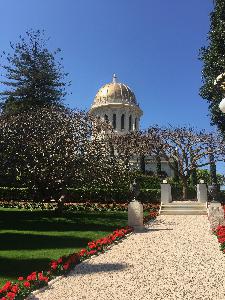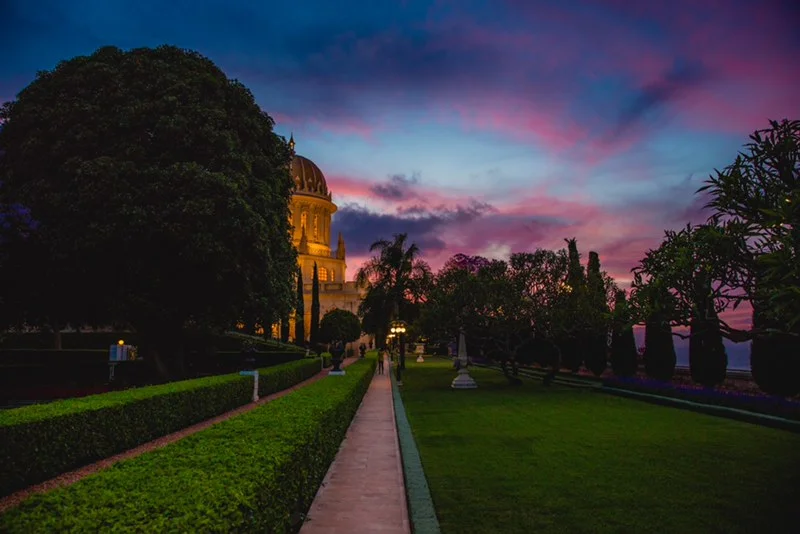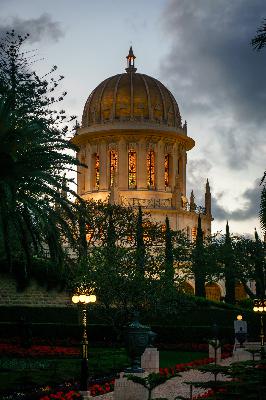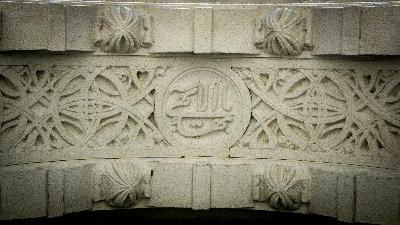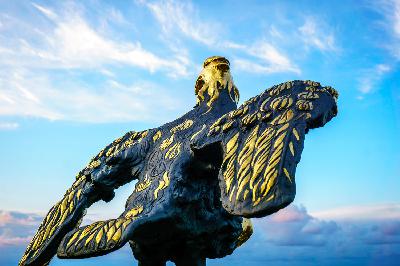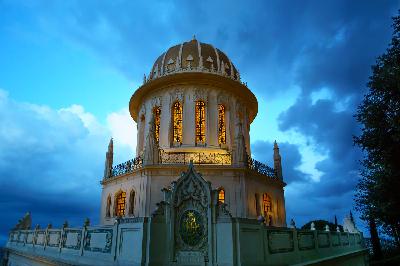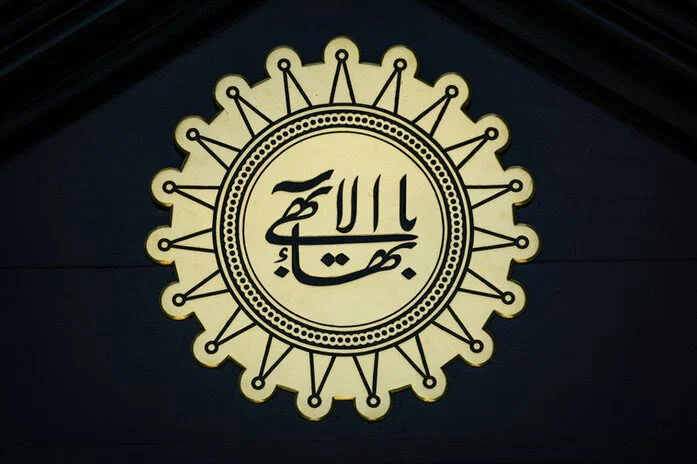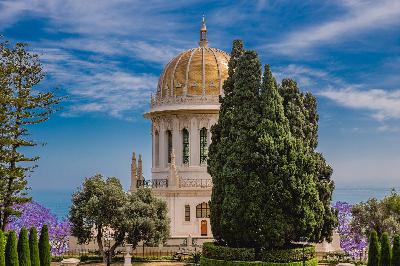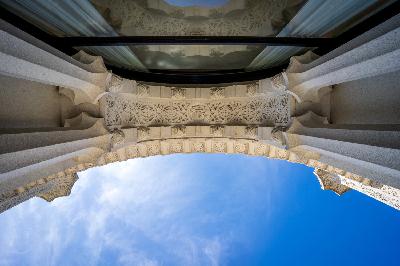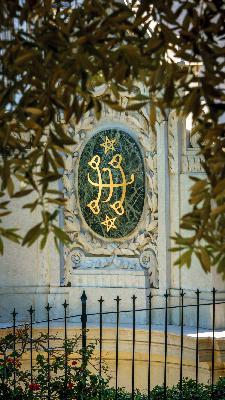Discover Bicentenary Meditation Project
Bicentenary Meditation Project

Bicentenary Meditation Project
Author: Nahal Haghbin
Subscribed: 3Played: 201Subscribe
Share
© Yoga Avec Moi
Description
The Bicentenary of the Birth of the Bab Meditation Project aims to create 365 days of guided meditations to commemorate the Bicentennial Birth of the Bab (October 2019 - October 2020) for every single day The Most Exalted, The Bab is in His 200th Year of Birth.
442 Episodes
Reverse
This episode is about the opening the heart chakra to Baha'u'llah
Read by Nahal Haghbin
THE UNIVERSAL HOUSE OF JUSTICEOctober 2019
To all who have come to honour the Herald of a new DawnDearly loved Friends,Consider with us. Whenever a divine Educator appears in the world, a Figure Whoseteachings will come to shape human thought and action for centuries thereafter—at such adramatic, seismic moment, what would we expect?The appearance of every such Educator, as recorded in the Sacred Texts of the world’sgreat faiths, is a pivotal event that propels the advancement of civilization. The spiritualstimulus each has provided throughout history has enabled the radius of human cooperation toextend from the clan, to the tribe, to the city-state, and to the nation. And each of these greatTeachers promised that, in time, another divine Figure would appear, Whose advent should beanticipated and Whose influence would reform the world. No wonder, then, that the coming of the Báb, Whose Birth two centuries ago we now honour, gave rise to unprecedented ferment in the country where He was born. The moment of His appearance, like the appearance of all such Figures, precipitated the release of powerful spiritual forces—but there was no accompanying spectacle. There was instead a late evening conversation, in a modest Persian dwelling, between a student of religion and his youthful Host, during which that Host revealed that He was the Promised One, the divine Educator His guest had been seeking. “Observe attentively,” He remarked, “Might not the Person intended … be none other than I?” It is this Youth, the Báb, that we acclaim as the One Whose coming—after an interval of a thousand years—shed the light of divine guidance once again upon the human world.From this first moment unfolded all that has since come to pass. The Báb’s Writingsflowed profusely from His pen, disclosing profound truths, dismissing superstitions that heldsway in His day, urging the people to recognize the significance of the times, castigating thehypocrisy of their leaders, and summoning the world to an exalted standard of conduct.“O peoples of the earth!” He declares in one of His major works, “Verily the resplendent Light of God hath appeared in your midst … that ye may be guided aright to the ways of peace and, by the leave of God, step out of the darkness into the light and onto this far-extended Path of Truth.” His influence spread with extraordinary rapidity, reaching beyond the limits of Persia. Observers were astonished alike by the fast-swelling numbers of His followers and by their deeds of unsurpassed bravery and devotion. Accounts of the Báb’s life—the swift arc it traced and the tragic drama that ended it—induced curious souls to travel to Persia and investigate further, and inspired a range of artistic tributes to His Person.The brilliance of the light of the Báb seems the more dazzling when set against thedarkness of the social milieu in which He appeared. Nineteenth-century Persia was farremoved from its glory days when its civilization was the envy of the world. Ignorance now prevailed; senseless dogmas went unchallenged; inequality was fuelled by rampant corruption. Religion, the foundation of Persia’s former prosperity, had become a body devoid of its animating spirit. Each succeeding year offered the subjugated masses only disillusionment and hopelessness. Oppression was complete. Then, like a spring storm, the Báb came to purge and purify, to uproot the withered and spent customs of a wayward age, and to wash away the obscuring dust from the eyes of those blinded by illusion. But the Báb had a special object in view. He sought to prepare people for the imminent appearance of Bahá’u’lláh—the second of the Twin Luminaries destined to bring new light to humankind. This was His most insistent theme. “When the Daystar of Bahá will shine resplendent above the horizon of eternity”, He instructed His followers, “it is incumbent upon you to present yourselves before His Throne.” Thus did the Báb and, with even greater splendour, Bahá’u’lláh illuminate a society andan age shrouded in darkness. They inaugurated a new stage in social evolution: the stage of the unification of the entire human family. The spiritual energies They released into the worldinfused a new life into every sphere of endeavour, the results of which are evident in thetransformation that has occurred. Material civilization has advanced immeasurably; astounding breakthroughs in science and technology have been achieved; the gates to the accumulated knowledge of humanity have been flung open. And principles set out by Bahá’u’lláh for the upliftment and progress of society and for ending systems of domination and exclusion have come to be widely accepted. Consider His teaching that humanity is one people, or that women are equal with men, or that education must be universal, or that rational investigation of the truth must prevail over fanciful theories and prejudices. Across all nations, a large segment of the world’s people now agrees with these fundamental values.Nevertheless, arguments against these values, previously confined to the margins ofserious thought, are also resurgent in society—a reminder that ideals require the force ofspiritual commitment to cement them. For it is one thing to acknowledge something inprinciple; it is quite another to embrace it with all of one’s heart, and harder still to refashionsociety in ways that give collective expression to it. Yet this is the aim of communitiesemerging across the globe that are patterned on Bahá’u’lláh’s teachings. These communitiesare striving to focus the light of those teachings on the chronic problems that afflict the societies around them; they are devising programmes of practical action centred on spiritual precepts. These are communities that champion the education of both girls and boys under all circumstances; that subscribe to an expanded conception of worship which includes work carried out in the spirit of service; that look to spiritual aspirations, rather than self-interest, as the ever-flowing springs of motivation; and that inculcate a resolve to advance individual and social transformation. They seek to bring about spiritual, social, and material progress simultaneously. Above all, these are communities that define themselves by their commitment to the oneness of humanity. They value the rich diversity represented by all the world’s kindreds, while maintaining that one’s identity as a member of the human race has precedence before other identities and associations. They affirm the need for a global consciousness, arising from a shared concern for the well-being of humankind, and they count all the peoples of the earth as spiritual brothers and sisters. Not content with simply belonging to such communities, Bahá’u’lláh’s followers are making constant effort to invite like-minded souls to join them in learning how to put His teachings into effect.This brings us to the crux of our case. The matter at hand is a challenging one, andrequires candour. There are many noble and admirable causes in the world, and they arise from particular perspectives, each with its own merit. Is the Cause of Bahá’u’lláh merely one amongst them? Or is it universal, embodying the highest ideals of all humanity? After all, a Cause that is to be the wellspring of enduring justice and peace—not for one place or one people, but for all places and all peoples—must be inexhaustible, must possess a heavenly vitality that allows it to transcend all limitations and encompass every dimension of the life of humanity. Ultimately, it must have the power to transform the human heart. Then let us, like the Báb’s guest, observe attentively. Does not the Cause of Bahá’u’lláh possess these very qualities? If the teachings brought by Bahá’u’lláh are what will enable humanity to advance to thehighest levels of unity, then one must search the soul for the right response. The multitudeswho recognized the Báb were summoned to heroism, and their magnificent response is recorded by history. Let every one who is awake to the condition of the world, and to the persistent evils that warp the lives of its inhabitants, heed Bahá’u’lláh’s call to selfless and steadfast service— heroism for the present age. What else will rescue the world but the efforts of countless souls who each make the welfare of humanity their principal, their dominating concern?
[signed] The Universal House of Justice
Significance of Repeating
The Greatest Name Alláh-u-Abha
“`Abdu'l-Bahá teaches how the practice of invocation or repetition of “The Greatest Name” (Alláh-u-Abhá, God is Most Glorious) leads to union with God, illumination and spiritual rebirth. The use of invocation is well developed among the mystics of Islam, the Sufis. The repetition of sacred phrases is called dhikr (promounced zikr, meaning remembrance). This spiritual practice of invocation is praised by `Abdu'l-Bahá. He encourages spiritual seekers to “recite the Greatest Name at every morn, and (to) turn…unto the kingdom of Abhá, until though mayest apprehend the mysteries.
Through the invocation fo the Greatest Name, `Abdu'l-Bahá maintains that “the doors of the kingdom of God open, illumination is vouchsafed and divine union results…The use of the Greatest Name, and dependence upon it, causes the soul to strip itself of the husks of morality and to step forth freed, reborn, a new creature.”
`Abdu'l-Bahá encourages the use of the sacred phrase Alláh-u-Abhá as a focus for invocation: “The Greatest Name should be found upon the lips in the first awakening moment of early dawn. It should be fed upon by constant use in daily invocation, in trouble, under opposition, and should be the last word breathed when the head rests upon the pillow at night. It is the name of comfort, protection, happiness, illumination, love and unity. “
Pages 57-58 from the Book, Wisdom of the Masters: The Spiritual Teachings of `Abdu'l-Bahá, References 54-56 (The reference in the back of the book is below if you would like further details)
“The Greatest Name, Symbol of the Cause”, Baha’i News (Oct 1964), p. 2. Also see Steven Scholl, “The Remembrance of God: An invocation Technique in Sufiism and the Writings of the Bas and Baha’u’llah, “ Baha’i Studies Bulletin (1985).
Why say The Greatest Name Alláh-u-Abhá 95 Times?
In the book ‘Gate of the Heart’ by Nader Saiedi, he explains that the significance of the number 95 originates from the Persian Bayán, where the Báb states that ninety-five stands for the numerical value of "for God" (lillāh), symbolizing the recognition of the manifestation of God and obedience to his laws, which are inseparable from each other, as confirmed by Bahá'u'lláh in the opening paragraph of the Kitáb-i-Aqdas.
The 95 Alláh-u-Abhá Meditation audio is a meditation that includes a chanted repetition of the sacred word Alláh-u-Abhá, which means ‘God the All-Glorious’.
According to Note 33 from the The Kitáb-i-Aqdas,
“It hath been ordained that every believer in God … shall, each day … repeat “Alláh-u-Abhá” ninety-five times.
“Alláh-u-Abhá” is an Arabic phrase meaning “God the All-Glorious.” It is a form of the Greatest Name of God (see note 137). In Islám there is a tradition that among the many names of God, one was the greatest; however, the identity of this Greatest Name was hidden. Bahá’u’lláh has confirmed that the Greatest Name is “Bahá.”
The various derivatives of the word “Bahá” are also regarded as the Greatest Name. Shoghi Effendi’s secretary writing on his behalf explains that
“The Greatest Name is the Name of Bahá’u’lláh. “Yá Bahá’u’l-Abhá” is an invocation meaning: “O Thou Glory of Glories!” “Alláh-u-Abhá” is a greeting which means: “God the All-Glorious.” Both refer to Bahá’u’lláh. By Greatest Name is meant that Bahá’u’lláh has appeared in God’s Greatest Name, in other words, that He is the supreme Manifestation of God. “
The greeting “Alláh-u-Abhá” was adopted during the period of Bahá’u’lláh’s exile in Adrianople.
The repetition of “Alláh-u-Abhá” ninety-five times is to be preceded by the performance of ablutions (see note 34).”
Alláh-u-Abhá also appears in the Prayer for the Dead as indicated in Note 11 from the The Kitáb-i-Aqdas,
“The passages that form part of the Prayer for the Dead comprise the repetition of the greeting “Alláh-u-Abhá” (God is the All-Glorious) six times, each followed by nineteen repetitions of one of six specifically revealed verses.”
“O Thou kind and loving Providence! The east is astir and the west surgeth even as the eternal billows of the sea. The gentle breezes of holiness are diffused and, from the Unseen Kingdom, the rays of the Orb of Truth shine forth resplendent. The anthems of divine unity are being chanted and the ensigns of celestial might are waving. The angelic Voice is raised and, even as the roaring of the leviathan, soundeth the call to selflessness and evanescence. The triumphal cry Yá Bahá’u’l-Abhá resoundeth on every side, and the call Yá ‘Alíyyu’l‑‘Alá ringeth throughout all regions. No stir is there in the world save that of the Glory of the One Ravisher of Hearts, and no tumult is there save the surging of the love of Him, the Incomparable, the Well-Beloved.”
- ‘Abdu’l‑Bahá (Selections from the Writings of ‘Abdu’l‑Bahá 223)
“O that I could travel, even though on foot and in the utmost poverty, to these regions, and, raising the call of “Yá Bahá’u’l-Abhá” in cities, villages, mountains, deserts and oceans, promote the divine teachings! This, alas, I cannot do. How intensely I deplore it! Please God, ye may achieve it.”
- ‘Abdu’l-Bahá (Tablet to the Bahá’ís of the United States and Canada)
“The various derivatives of the word “Bahá” are also regarded as the Greatest Name. Shoghi Effendi’s secretary writing on his behalf explains that
The Greatest Name is the Name of Bahá’u’lláh. “Yá Bahá’u’l-Abhá” is an invocation meaning: “O Thou Glory of Glories!” “Alláh-u-Abhá” is a greeting which means: “God the All-Glorious.” Both refer to Bahá’u’lláh. By Greatest Name is meant that Bahá’u’lláh has appeared in God’s Greatest Name, in other words, that He is the supreme Manifestation of God.” - Baha’u’llah, The Kitáb-i-Aqdas Note 33
“Yá Bahá'u'l-Abhá – This is an invocation. It means "O Glory of the All-Glorious." In this connection we recall the soul stirring message of the Guardian in 1953 to the Intercontinental Conferences where he refers to "Yá Bahá'u'l-Abhá" and "Yá `Aliyyu'l-'Ala" as the "battle cry" of the pioneers and teachers in the many fields of this world-embracing spiritual Crusade. The first, as already stated, means "O Glory of the All-Glorious", while the second means "O Exalted of the Most Exalted One." - Abu'l-Qasim Faizi
Why say Yá Bahá'u'l-Abhá 95 Times?
In the book ‘Gate of the Heart’ by Nader Saiedi, he explains that the significance of the number 95 originates from the Persian Bayán, where the Báb states that ninety-five stands for the numerical value of "for God" (lillāh), symbolizing the recognition of the manifestation of God and obedience to his laws, which are inseparable from each other, as confirmed by Bahá'u'lláh in the opening paragraph of the Kitáb-i-Aqdas.
The 95 Yá Bahá'u'l-Abhá & Yá ‘Alíyyu’l‑‘Alá Meditation audio is a meditation that includes a chanted repetition of the sacred word of both Yá Bahá'u'l-Abhá & Yá ‘Alíyyu’l‑‘Alá together 95 times, which means "O Glory of the All-Glorious" (referring to Baha’u’llah), while the second means "O Exalted of the Most Exalted One” (referring to the Báb.
If you would like to learn more about the Symbol of the Greatest Name itself, click here to be directed to a detailed explanation by Hand of the Cause Abu'l-Qasim Faizi.
“God hath exempted women who are in their courses from obligatory prayer and fasting. Let them, instead, after performance of their ablutions, give praise unto God, repeating ninety-five times between the noon of one day and the next “Glorified be God, the Lord of Splendor and Beauty.” Thus hath it been decreed in the Book, if ye be of them that comprehend.” - Bahá’u’lláh The Kitáb-i-Aqdas
Why 95 Times?
In the book ‘Gate of the Heart’ by Nader Saiedi, he explains that the significance of the number 95 originates from the Persian Bayán, where the Báb states that ninety-five stands for the numerical value of "for God" (lillāh), symbolizing the recognition of the manifestation of God and obedience to his laws, which are inseparable from each other, as confirmed by Bahá'u'lláh in the opening paragraph of the Kitáb-i-Aqdas.
The 95 Glorified be God, the Lord of Splendor and Beauty meditation audio is a meditation that includes the repeated phrase repetition of the sacred word of “Glorified be God, the Lord of Splendor and Beauty” in English 95 times.
“These daily obligatory prayers, together with a few other specific ones,
such as the Healing Prayer, the Tablet of Aḥmad, have been invested by
Bahá’u’lláh with a special potency and significance, and should therefore
be accepted as such and be recited by the believers with unquestioning
faith and confidence, that through them they may enter into a much closer
communion with God, and identify themselves more fully with His laws and
precepts.”
—From a letter written on behalf of Shoghi Effendi
The Significance of Yá Allahu’l-Mustaghath
I found a very comprehensive blog post about the explanation of Yá Allahu’l-Mustaghath, and decided to include it in full below for reference. Beneath it are additional explanations found elsewhere.
“When Ali Kuli Khan served the Cause in the United States, it happened that he frequently met with representatives of Iran in that country. In some of those situations, he had to take instant decisions of diplomatic character. In such situations, although he did his best, he felt that his limited wisdom restricted him from taking the best possible decisions. He therefore, wished he had a prayer he could recite to be guided in such situations. He had this question in His mind and thought of asking the Master about it.
When the Master arrived to Washington, Ali Kuli Khan met Him at the station. Ali Kuli Khan had this question in his heart and about halfway back from the station, the Master suddenly told a story to Ali Kuli Khan.
`Abdu’l-Bahá told of the time in Bagdad when Bahá’u’lláh had retired to the mountains. His family did not know where He had gone and were extremely worried. `Abdu’l-Bahá was a boy at that time and the absence of His Father was very difficult. One night, `Abdu’l-Bahá recited and supplicated with all his heart saying “Ya Allah el Mustaghas! Ya Allah el Mustaghas!” all night. In the morning after, at the break of dawn, `Abdu’l-Bahá received a message which he understood to be about the return of Bahá’u’lláh.
Ali Kuli Khan understood that the invocation of “Ya Allah el Mustaghas!” would be the prayer to utter in moments of need.
It seems that `Abdu’l-Bahá used this powerful prayer at different occasions. Mirzieh Gail recounts the following (Arches of the Years, page 312).
Shoghi Effendi also had the burden of the believers’ personal griefs. Florence once asked him for a very powerful prayer, and he answered, ‘What could be better than Yá Allahu’l-Mustaghath?’ … It was her understanding that this was the prayer repeated over and over by the Master, as He paced His garden when the Turkish ship was coming to take Him away.
The Universal House of Justice clarifies that the phrase “Yá Allahu’l-Mustaghath”, … is an invocation revealed by the Bab. He prescribed it for recitation by His followers in times of trouble and difficulty. Shoghi Effendi has translated the word “Mustaghath” as “He who is invoked for help”. (Universal House of Justice, 25 Nov 1999)
In the same letter, The Universal House of Justice clarifies that “In the Writings of the Bab, “Mustaghath” refers to Bahá’u’lláh, and “the time of ‘Mustaghath‘” refers to the time of Bahá’u’lláh’s Dispensation. … Mustaghath literally means “He Who is invoked. It denotes the cycle of every Divine Manifestation, referred to in the writings of the Báb and Bahá’u’lláh.” (Universal House of Justice, 25 Nov 1999)
It seems that the One being invoked for help is Bahá’u’lláh. Perhaps the following explanation of `Abdu’l-Bahá about the phrase “He is God”, can explain why Bahá’u’lláh is invoked.
“Regarding the phrase ‘HE IS GOD!’ written above the Tablets. By this Word is intended that no one hath any access to the Invisible Essence. The way is barred and the road is impassable. In this world all men must turn their faces toward ‘Him-whom-God-shall-Manifest.’ He is the Dawning-place of Divinity and the Manifestation of Deity. He is the Ultimate Goal, the Adored One of all and the Worshipped One of all. Otherwise, whatever flashes through the mind is not that Essence of essences and Reality of realities; nay, rather it is pure imagination woven by man—consequently, it returns finally to the realm of suppositions and conjectures.” (Star of the West, Vol 4, issue 18, page 304)
The Universal House of Justice also clarifies that the number of times this phrase is to be repeated is up to the individual.
With regard to the number of times these words are to be repeated, the repetition of this invocation is not definitely fixed, and there is a great deal of flexibility concerning the repetition of this and other prayers. While the invocation is prescribed in the Writings of the Báb to be repeated 2098 times during occasions of great need, ‘Abdu’l-Bahá in one Tablet states that this verse is to be repeated 95 times and, in another Tablet, 81 times. Letters from the Guardian concerning this invocation, as well as other prayers, indicate that repetition is a matter of individual choice. In a postscript added in his own handwriting to a letter to an individual he stated: “There is no objection to saying “Yá Ilaha‘l-Mustaghath” any time you like and as often as you like.” (Universal House of Justice, 25 Nov 1999)
And finally, as to the correct transliteration, we have the following guidance.
“This phrase can be correctly transliterated in two ways, as set out below: (elaha’l … ) “Yá Ilaha‘l-Mustaghath”, which has been translated as “O Lord of the time of ‘Mustaghath’ “[or] “Yá Allahu’l-Mustaghath”, which has been translated as “O Thou God Who art invoked” (Universal House of Justice, 25 Nov 1999)”
Additional information has been included from the following sources,
From Mme. Khan’s Pilgrim’s Notes on Feb 23, 1938: To be prayed or repeated 1000 times between midnight and dawn for 9 or 19 nights (though to use the prayer once daily or even 9 or 19 times is enough). It seems infallible, even marvellous in power. ‘Abdu’l-Bahá said it for 3 days just before WW2 ended: Ya Allau’l-Mustagath! O God Our Deliverer, whom we invoke in times of extreme need, danger, or crisis!
The Báb used these terms when He addressed the possible opposition of the divines and people of the Bayán to the coming Revelation. You may wish to study other references to “the mystery of the ‘Mustagháth‘” in the Bahá’í Writings, such as The Kitáb-i-Íqán (Wilmette: Bahá’í Publishing Trust, 1983), pages 229–30, God Passes By (Wilmette: Bahá’í Publishing Trust, 1987), page 27; and The Dawn-Breakers: Nabíl’s Narrative of the Early Days of the Bahá’í Revelation (Wilmette: Bahá’í Publishing Trust, 1974), pages 304–305. (Universal House of Justice, 28 December 2001)
According to Star of the West, Sep 1923, Vol. 14, No. 6, p. 166: This prayer is to be used at midnight. followed by the recitation of the Greatest Name 95 times, using "Ya Allah El-Mustagath", which means: "O Thou God from Whom relief and help is sought most urgently."
This prayer was revealed by Baha'u'llah for Mirza Abul Fazl when the latter went into exile with the promise that if he would use it any juncture, help would come.
Why say Yá Allahu’l-Mustaghath 95 Times?
In the references above, the Universal House of Justice has mentions that the phrase Yá Allahu’l-Mustaghath is not fixed and may be repeated 2098, 81, 95 times or up to any number of times. For the purposes of the Bicentenary Meditation Project, the number 95 has been chosen for the following reasons.
In the book ‘Gate of the Heart’ by Nader Saiedi, he explains that the significance of the number 95 originates from the Persian Bayán, where the Báb states that ninety-five stands for the numerical value of "for God" (lillāh), symbolizing the recognition of the manifestation of God and obedience to his laws, which are inseparable from each other, as confirmed by Bahá'u'lláh in the opening paragraph of the Kitáb-i-Aqdas.
95 Yá Allahu’l-Mustaghath Audio Meditation
The 95 Yá Allahu’l-Mustaghath audio meditation is a meditation that includes a repetition of the invocation Yá Allahu’l-Mustaghath, which means ‘He Who is invoked’, 95 times by the Artist Sarah Hosny; an Egyptian Baha’i Musician. She has generously and freely donated her time for the Bicentenary Meditation Project in order to ensure the authenticity of the invocations accent in Arabic. Thank you so much Sarah!
If you would like to donate your time or services to the Bicentenary Meditation Project as a meditation content creator, Illustrator or photography, please don’t hesitation to contact us at meditationsofbbobb@gmail.com! We would love to include you as a participant and contributor to the Bicentenary Meditation Project as well
Where Does The Prayer for Natural Phenomena Come From?
“We have absolved you from the requirement of performing the Prayer of the Signs. On the appearance of fearful natural events call ye to mind the might and majesty of your Lord, He Who heareth and seeth all, and say “Dominion is God’s, the Lord of the seen and the unseen, the Lord of creation.”
- Bahá'u'lláh The Kitáb-i-Aqdas
”18. We have absolved you from the requirement of performing the Prayer of the Signs.
The Prayer of the Signs is a special form of Muslim obligatory prayer that was ordained to be said in times of natural events, like earthquakes, eclipses, and other such phenomena, which may cause fear and are taken to be signs or acts of God. The requirement of performing this prayer has been annulled. In its place a Bahá’í may say, “Dominion is God’s, the Lord of the seen and the unseen, the Lord of creation,” but this is not obligatory (Q&A).
- Note 18 of the The Kitáb-i-Aqdas
Why Repeat the Phrase 95 Times?
It is important to note that absolutely no where in the Sacred Writings does it mention repeating this phrase 95 times. it has been repeated 95 times for the Bicentenary Meditation Project only and PURELY for the purposes of meditation.
The number 95 was chosen for the following reasons.
In the book ‘Gate of the Heart’ by Nader Saiedi, he explains that the significance of the number 95 originates from the Persian Bayán, where the Báb states that ninety-five stands for the numerical value of "for God" (lillāh), symbolizing the recognition of the manifestation of God and obedience to his laws, which are inseparable from each other, as confirmed by Bahá'u'lláh in the opening paragraph of the Kitáb-i-Aqdas.
Prayer for Natural Phenomena Meditation
The Prayer for Natural Phenomena is a meditation that includes a repetition of the phrase “Dominion is God's, the Lord of the seen and the unseen, the Lord of creation” 95 times.
If you would like to donate your time or services to the Bicentenary Meditation Project as a meditation content creator, Illustrator or photography, please don’t hesitation to contact us at meditationsofbbobb@gmail.com! We would love to include you as a participant and contributor to the Bicentenary Meditation Project as well!
The Prayer for Making a Difficult Decision audio meditation is a meditation
that includes a repetition of the Holy Phrase “Thou seest me, O my God,
detached from all save Thee and cleaving unto Thee. Guide me, then,
in all mine affairs unto that which profiteth me for the glory of Thy Cause
and the loftiness of the station of Thy loved ones” 19 times.
If you would like to donate your time or services to the Bicentenary
Meditation Project as a meditation content creator, Illustrator or
photography, please don’t hesitation to contact us at
meditationsofbbobb@gmail.com! We would love to include you as a participant
and contributor to the Bicentenary Meditation Project as well!
Significance of Repeating
The Greatest Name Alláh-u-Abha
“`Abdu'l-Bahá teaches how the practice of invocation or repetition of “The Greatest Name” (Alláh-u-Abhá, God is Most Glorious) leads to union with God, illumination and spiritual rebirth. The use of invocation is well developed among the mystics of Islam, the Sufis. The repetition of sacred phrases is called dhikr (promounced zikr, meaning remembrance). This spiritual practice of invocation is praised by `Abdu'l-Bahá. He encourages spiritual seekers to “recite the Greatest Name at every morn, and (to) turn…unto the kingdom of Abhá, until though mayest apprehend the mysteries.
Through the invocation fo the Greatest Name, `Abdu'l-Bahá maintains that “the doors of the kingdom of God open, illumination is vouchsafed and divine union results…The use of the Greatest Name, and dependence upon it, causes the soul to strip itself of the husks of morality and to step forth freed, reborn, a new creature.”
`Abdu'l-Bahá encourages the use of the sacred phrase Alláh-u-Abhá as a focus for invocation: “The Greatest Name should be found upon the lips in the first awakening moment of early dawn. It should be fed upon by constant use in daily invocation, in trouble, under opposition, and should be the last word breathed when the head rests upon the pillow at night. It is the name of comfort, protection, happiness, illumination, love and unity. “
Pages 57-58 from the Book, Wisdom of the Masters: The Spiritual Teachings of `Abdu'l-Bahá, References 54-56 (The reference in the back of the book is below if you would like further details)
“The Greatest Name, Symbol of the Cause”, Baha’i News (Oct 1964), p. 2. Also see Steven Scholl, “The Remembrance of God: An invocation Technique in Sufiism and the Writings of the Bas and Baha’u’llah, “ Baha’i Studies Bulletin (1985).
Why say The Greatest Name Alláh-u-Abhá 95 Times?
In the book ‘Gate of the Heart’ by Nader Saiedi, he explains that the significance of the number 95 originates from the Persian Bayán, where the Báb states that ninety-five stands for the numerical value of "for God" (lillāh), symbolizing the recognition of the manifestation of God and obedience to his laws, which are inseparable from each other, as confirmed by Bahá'u'lláh in the opening paragraph of the Kitáb-i-Aqdas.
The 95 Alláh-u-Abhá Meditation audio is a meditation that includes a chanted repetition of the sacred word Alláh-u-Abhá, which means ‘God the All-Glorious’.
According to Note 33 from the The Kitáb-i-Aqdas,
“It hath been ordained that every believer in God … shall, each day … repeat “Alláh-u-Abhá” ninety-five times.
“Alláh-u-Abhá” is an Arabic phrase meaning “God the All-Glorious.” It is a form of the Greatest Name of God (see note 137). In Islám there is a tradition that among the many names of God, one was the greatest; however, the identity of this Greatest Name was hidden. Bahá’u’lláh has confirmed that the Greatest Name is “Bahá.”
The various derivatives of the word “Bahá” are also regarded as the Greatest Name. Shoghi Effendi’s secretary writing on his behalf explains that
“The Greatest Name is the Name of Bahá’u’lláh. “Yá Bahá’u’l-Abhá” is an invocation meaning: “O Thou Glory of Glories!” “Alláh-u-Abhá” is a greeting which means: “God the All-Glorious.” Both refer to Bahá’u’lláh. By Greatest Name is meant that Bahá’u’lláh has appeared in God’s Greatest Name, in other words, that He is the supreme Manifestation of God. “
The greeting “Alláh-u-Abhá” was adopted during the period of Bahá’u’lláh’s exile in Adrianople.
The repetition of “Alláh-u-Abhá” ninety-five times is to be preceded by the performance of ablutions (see note 34).”
Alláh-u-Abhá also appears in the Prayer for the Dead as indicated in Note 11 from the The Kitáb-i-Aqdas,
“The passages that form part of the Prayer for the Dead comprise the repetition of the greeting “Alláh-u-Abhá” (God is the All-Glorious) six times, each followed by nineteen repetitions of one of six specifically revealed verses.”
“O Thou kind and loving Providence! The east is astir and the west surgeth even as the eternal billows of the sea. The gentle breezes of holiness are diffused and, from the Unseen Kingdom, the rays of the Orb of Truth shine forth resplendent. The anthems of divine unity are being chanted and the ensigns of celestial might are waving. The angelic Voice is raised and, even as the roaring of the leviathan, soundeth the call to selflessness and evanescence. The triumphal cry Yá Bahá’u’l-Abhá resoundeth on every side, and the call Yá ‘Alíyyu’l‑‘Alá ringeth throughout all regions. No stir is there in the world save that of the Glory of the One Ravisher of Hearts, and no tumult is there save the surging of the love of Him, the Incomparable, the Well-Beloved.”
- ‘Abdu’l‑Bahá (Selections from the Writings of ‘Abdu’l‑Bahá 223)
“O that I could travel, even though on foot and in the utmost poverty, to these regions, and, raising the call of “Yá Bahá’u’l-Abhá” in cities, villages, mountains, deserts and oceans, promote the divine teachings! This, alas, I cannot do. How intensely I deplore it! Please God, ye may achieve it.”
- ‘Abdu’l-Bahá (Tablet to the Bahá’ís of the United States and Canada)
“The various derivatives of the word “Bahá” are also regarded as the Greatest Name. Shoghi Effendi’s secretary writing on his behalf explains that
The Greatest Name is the Name of Bahá’u’lláh. “Yá Bahá’u’l-Abhá” is an invocation meaning: “O Thou Glory of Glories!” “Alláh-u-Abhá” is a greeting which means: “God the All-Glorious.” Both refer to Bahá’u’lláh. By Greatest Name is meant that Bahá’u’lláh has appeared in God’s Greatest Name, in other words, that He is the supreme Manifestation of God.” - Baha’u’llah, The Kitáb-i-Aqdas Note 33
“Yá Bahá'u'l-Abhá – This is an invocation. It means "O Glory of the All-Glorious." In this connection we recall the soul stirring message of the Guardian in 1953 to the Intercontinental Conferences where he refers to "Yá Bahá'u'l-Abhá" and "Yá `Aliyyu'l-'Ala" as the "battle cry" of the pioneers and teachers in the many fields of this world-embracing spiritual Crusade. The first, as already stated, means "O Glory of the All-Glorious", while the second means "O Exalted of the Most Exalted One." - Abu'l-Qasim Faizi
Why say Yá Bahá'u'l-Abhá 95 Times?
In the book ‘Gate of the Heart’ by Nader Saiedi, he explains that the significance of the number 95 originates from the Persian Bayán, where the Báb states that ninety-five stands for the numerical value of "for God" (lillāh), symbolizing the recognition of the manifestation of God and obedience to his laws, which are inseparable from each other, as confirmed by Bahá'u'lláh in the opening paragraph of the Kitáb-i-Aqdas.
The 95 Yá Bahá'u'l-Abhá & Yá ‘Alíyyu’l‑‘Alá Meditation audio is a meditation that includes a chanted repetition of the sacred word of both Yá Bahá'u'l-Abhá & Yá ‘Alíyyu’l‑‘Alá together 95 times, which means "O Glory of the All-Glorious" (referring to Baha’u’llah), while the second means "O Exalted of the Most Exalted One” (referring to the Báb.
If you would like to learn more about the Symbol of the Greatest Name itself, click here to be directed to a detailed explanation by Hand of the Cause Abu'l-Qasim Faizi.
The Prayer for Making a Difficult Decision audio meditation is a meditation
that includes a repetition of the Holy Phrase “Thou seest me, O my God,
detached from all save Thee and cleaving unto Thee. Guide me, then, in all
mine affairs unto that which profiteth me for the glory of Thy Cause and
the loftiness of the station of Thy loved ones” 95 times.
If you would like to donate your time or services to the Bicentenary
Meditation Project as a meditation content creator, Illustrator or
photography, please don’t hesitation to contact us at
meditationsofbbobb@gmail.com! We would love to include you as a participant
and contributor to the Bicentenary Meditation Project as well!
“We have absolved you from the requirement of performing the Prayer of the
Signs. On the appearance of fearful natural events call ye to mind the
might and majesty of your Lord, He Who heareth and seeth all, and say
“Dominion is God’s, the Lord of the seen and the unseen, the Lord of
creation.”
- Bahá'u'lláh The Kitáb-i-Aqdas
`“The Greatest Name is the Name of Bahá’u’lláh. “Yá Bahá’u’l-Abhá” is an
invocation meaning: “O Thou Glory of Glories!” “Alláh-u-Abhá” is a greeting
which means: “God the All-Glorious.” Both refer to Bahá’u’lláh. By Greatest
Name is meant that Bahá’u’lláh has appeared in God’s Greatest Name, in
other words, that He is the supreme Manifestation of God. “
“In Islám there is a tradition that among the many names of God, one was
the greatest; however, the identity of this Greatest Name was hidden.
Bahá’u’lláh has confirmed that the Greatest Name is “Bahá.”
- Note 33 from the The Kitáb-i-Aqdas,
The Greatest Name symbol is based on the Arabic root word of “Bahá” meaning
Glory, splendor or light.
This is a meditation based on the moment that The Báb declared His mission in Shiraz on May 22nd, 1844 as the Herald of "Him Whom God Shall Make Manifest".
This meditation is a guide through the physical experiences of Mullah Husayn soon after The Báb declared His mission. Excitement, awe, joy, wonderment are a few emotions that are encouraged to be felt in the physical body amongst others. This type of method and practice of meditation is considered quite advanced, and is encouraged to be practiced with caution.
If at any moment the emotions that are being asked to be experienced becomes too intense and burdensome on the body, immediately stop the meditation, or switch to another meditation, such as the Heart meditation which is a more gentle and mild meditation practice.
Everyone responds differently in each mediation, and some types of meditation work more for some than others, there is no good versus bad feelings, more so like on a scale of personal preferences and conduciveness to spiritual growth.
As this meditation is the hallmark of intensity of emotions experienced by the first recipient of a new Divine Revelation, it will inevitably be more intense in the emotions experienced and it's purpose is meant to be used for occasional inspiration, building of faith and encouragement, rather than a daily meditation practice.
Moderation is advised.
Significance of Repeating
The Greatest Name Alláh-u-Abha
“`Abdu'l-Bahá teaches how the practice of invocation or repetition of “The Greatest Name” (Alláh-u-Abhá, God is Most Glorious) leads to union with God, illumination and spiritual rebirth. The use of invocation is well developed among the mystics of Islam, the Sufis. The repetition of sacred phrases is called dhikr (promounced zikr, meaning remembrance). This spiritual practice of invocation is praised by `Abdu'l-Bahá. He encourages spiritual seekers to “recite the Greatest Name at every morn, and (to) turn…unto the kingdom of Abhá, until though mayest apprehend the mysteries.
Through the invocation fo the Greatest Name, `Abdu'l-Bahá maintains that “the doors of the kingdom of God open, illumination is vouchsafed and divine union results…The use of the Greatest Name, and dependence upon it, causes the soul to strip itself of the husks of morality and to step forth freed, reborn, a new creature.”
`Abdu'l-Bahá encourages the use of the sacred phrase Alláh-u-Abhá as a focus for invocation: “The Greatest Name should be found upon the lips in the first awakening moment of early dawn. It should be fed upon by constant use in daily invocation, in trouble, under opposition, and should be the last word breathed when the head rests upon the pillow at night. It is the name of comfort, protection, happiness, illumination, love and unity. “
Pages 57-58 from the Book, Wisdom of the Masters: The Spiritual Teachings of `Abdu'l-Bahá, References 54-56 (The reference in the back of the book is below if you would like further details)
“The Greatest Name, Symbol of the Cause”, Baha’i News (Oct 1964), p. 2. Also see Steven Scholl, “The Remembrance of God: An invocation Technique in Sufiism and the Writings of the Bas and Baha’u’llah, “ Baha’i Studies Bulletin (1985).
Why say The Greatest Name Alláh-u-Abhá 95 Times?
In the book ‘Gate of the Heart’ by Nader Saiedi, he explains that the significance of the number 95 originates from the Persian Bayán, where the Báb states that ninety-five stands for the numerical value of "for God" (lillāh), symbolizing the recognition of the manifestation of God and obedience to his laws, which are inseparable from each other, as confirmed by Bahá'u'lláh in the opening paragraph of the Kitáb-i-Aqdas.
The 95 Alláh-u-Abhá Meditation audio is a meditation that includes a chanted repetition of the sacred word Alláh-u-Abhá, which means ‘God the All-Glorious’.
According to Note 33 from the The Kitáb-i-Aqdas,
“It hath been ordained that every believer in God … shall, each day … repeat “Alláh-u-Abhá” ninety-five times.
“Alláh-u-Abhá” is an Arabic phrase meaning “God the All-Glorious.” It is a form of the Greatest Name of God (see note 137). In Islám there is a tradition that among the many names of God, one was the greatest; however, the identity of this Greatest Name was hidden. Bahá’u’lláh has confirmed that the Greatest Name is “Bahá.”
The various derivatives of the word “Bahá” are also regarded as the Greatest Name. Shoghi Effendi’s secretary writing on his behalf explains that
“The Greatest Name is the Name of Bahá’u’lláh. “Yá Bahá’u’l-Abhá” is an invocation meaning: “O Thou Glory of Glories!” “Alláh-u-Abhá” is a greeting which means: “God the All-Glorious.” Both refer to Bahá’u’lláh. By Greatest Name is meant that Bahá’u’lláh has appeared in God’s Greatest Name, in other words, that He is the supreme Manifestation of God. “
The greeting “Alláh-u-Abhá” was adopted during the period of Bahá’u’lláh’s exile in Adrianople.
The repetition of “Alláh-u-Abhá” ninety-five times is to be preceded by the performance of ablutions (see note 34).”
Alláh-u-Abhá also appears in the Prayer for the Dead as indicated in Note 11 from the The Kitáb-i-Aqdas,
“The passages that form part of the Prayer for the Dead comprise the repetition of the greeting “Alláh-u-Abhá” (God is the All-Glorious) six times, each followed by nineteen repetitions of one of six specifically revealed verses.”
The Baha’i Ring Symbol comprises three levels, each level indicated by a
number. Together they represent the underlying belief which is the basis of
all the religions of God. They are as follows:
(1) The World of God – The Creator
(2) The World of the Prophets or Manifestation – Cause, or Command
(3) The World of Man – Creation.
The followers of all religions believe that man, left to himself, can never
recognize God and attain His presence; nor is man able to fathom the
mystery and purpose of his own creation. God, in His unlimited bounty has
singled out His Chosen Ones and will continue to do so, sending them to man
at different times and ages in order to grant him penetrating insight and
to enable him to have a glimpse of the unfading glories of the innumerable
worlds beyond.
The Prophets accept descent from their realms on high and suffer the
abasement of living in human temples, walking amongst men and speaking
their languages. The Manifestations are invariably denied, ridiculed,
humiliated and even put to death. Were it not for their spiritual
upliftment and leadership, man would have continued to live as a wild beast
and would have been eternally doomed to deprivation and loss.
These functions of the Prophets are clearly demonstrated in the design of
the Greatest Name by having the world of the Prophets (shown in horizontal
line) repeated in vertical line, thus joining the world of the Creator to
that of His creation.
Regarding the Haykal, Baháʼu'lláh writes that it refers to the human or
physical temple of the Manifestation of God (prophets of God). He states
that the Manifestation of God is a pure mirror that reflects the
sovereignty of God and manifests God's beauty and grandeur to mankind. In
essence Baháʼu'lláh explains that the Manifestation of God is a "Living
Temple" and every time that Baháʼu'lláh addresses the Haykal he shows a new
facet of God's revelation.
The Haykal, which represents the Manifestation of God who spreads the Word
of God in the form of a human temple, has members each of whom symbolize
one of the signs and attributes of God. To the eyes of the Haykal he asks
it to not look at the world of creation, but instead to focus on the beauty
of God. To the Haykal's ears Baháʼu'lláh asks it to become deaf to the
voices of the ungodly and to listen to the Word of God. To the tongue of
the Haykal Baháʼu'lláh states that it has been created to mention the name
of God. To the hands of the Haykal Baháʼu'lláh asks them to stretch out
upon all humankind and hold within their grasp the reins of God. Finally,
Baháʼu'lláh states that from the heart of the Haykal knowledge will emerge
and raise scientists who will bring about technological achievements.
Significance of Repeating
The Greatest Name Alláh-u-Abha
“`Abdu'l-Bahá teaches how the practice of invocation or repetition of “The Greatest Name” (Alláh-u-Abhá, God is Most Glorious) leads to union with God, illumination and spiritual rebirth. The use of invocation is well developed among the mystics of Islam, the Sufis. The repetition of sacred phrases is called dhikr (promounced zikr, meaning remembrance). This spiritual practice of invocation is praised by `Abdu'l-Bahá. He encourages spiritual seekers to “recite the Greatest Name at every morn, and (to) turn…unto the kingdom of Abhá, until though mayest apprehend the mysteries.
Through the invocation fo the Greatest Name, `Abdu'l-Bahá maintains that “the doors of the kingdom of God open, illumination is vouchsafed and divine union results…The use of the Greatest Name, and dependence upon it, causes the soul to strip itself of the husks of morality and to step forth freed, reborn, a new creature.”
`Abdu'l-Bahá encourages the use of the sacred phrase Alláh-u-Abhá as a focus for invocation: “The Greatest Name should be found upon the lips in the first awakening moment of early dawn. It should be fed upon by constant use in daily invocation, in trouble, under opposition, and should be the last word breathed when the head rests upon the pillow at night. It is the name of comfort, protection, happiness, illumination, love and unity. “
Pages 57-58 from the Book, Wisdom of the Masters: The Spiritual Teachings of `Abdu'l-Bahá, References 54-56 (The reference in the back of the book is below if you would like further details)
“The Greatest Name, Symbol of the Cause”, Baha’i News (Oct 1964), p. 2. Also see Steven Scholl, “The Remembrance of God: An invocation Technique in Sufiism and the Writings of the Bas and Baha’u’llah, “ Baha’i Studies Bulletin (1985).
Why say The Greatest Name Alláh-u-Abhá 95 Times?
In the book ‘Gate of the Heart’ by Nader Saiedi, he explains that the significance of the number 95 originates from the Persian Bayán, where the Báb states that ninety-five stands for the numerical value of "for God" (lillāh), symbolizing the recognition of the manifestation of God and obedience to his laws, which are inseparable from each other, as confirmed by Bahá'u'lláh in the opening paragraph of the Kitáb-i-Aqdas.
The 95 Alláh-u-Abhá Meditation audio is a meditation that includes a chanted repetition of the sacred word Alláh-u-Abhá, which means ‘God the All-Glorious’.
According to Note 33 from the The Kitáb-i-Aqdas,
“It hath been ordained that every believer in God … shall, each day … repeat “Alláh-u-Abhá” ninety-five times.
“Alláh-u-Abhá” is an Arabic phrase meaning “God the All-Glorious.” It is a form of the Greatest Name of God (see note 137). In Islám there is a tradition that among the many names of God, one was the greatest; however, the identity of this Greatest Name was hidden. Bahá’u’lláh has confirmed that the Greatest Name is “Bahá.”
The various derivatives of the word “Bahá” are also regarded as the Greatest Name. Shoghi Effendi’s secretary writing on his behalf explains that
“The Greatest Name is the Name of Bahá’u’lláh. “Yá Bahá’u’l-Abhá” is an invocation meaning: “O Thou Glory of Glories!” “Alláh-u-Abhá” is a greeting which means: “God the All-Glorious.” Both refer to Bahá’u’lláh. By Greatest Name is meant that Bahá’u’lláh has appeared in God’s Greatest Name, in other words, that He is the supreme Manifestation of God. “
The greeting “Alláh-u-Abhá” was adopted during the period of Bahá’u’lláh’s exile in Adrianople.
The repetition of “Alláh-u-Abhá” ninety-five times is to be preceded by the performance of ablutions (see note 34).”
Alláh-u-Abhá also appears in the Prayer for the Dead as indicated in Note 11 from the The Kitáb-i-Aqdas,
“The passages that form part of the Prayer for the Dead comprise the repetition of the greeting “Alláh-u-Abhá” (God is the All-Glorious) six times, each followed by nineteen repetitions of one of six specifically revealed verses.”


